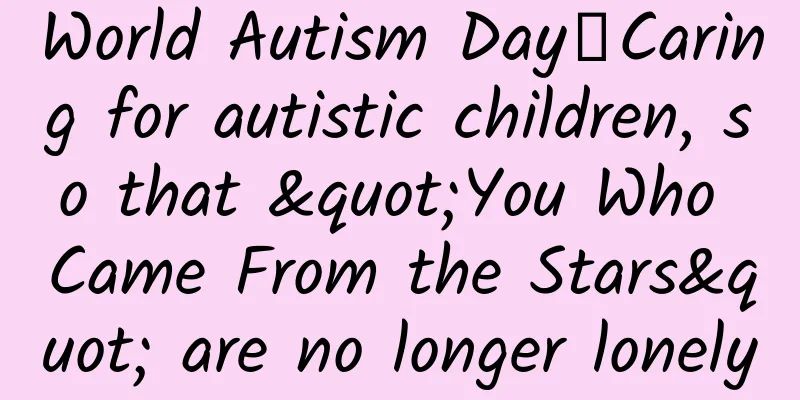World Autism Day丨Caring for autistic children, so that "You Who Came From the Stars" are no longer lonely

|
There is a group of special children around us. They are quietly immersed in their own world, just like the stars in the sky twinkling alone. They have bright eyes but lack eye contact, they have special interests and their behaviors are stereotyped and repetitive. They cannot express their inner thoughts with words or actions. They are called "children from the stars" and they have a common name "autistic children". April 2, 2025 is the 18th World Autism Day. This year's theme is: "Implement the implementation plan of the caring action and promote the comprehensive development of the autism group." It aims to raise public awareness of autism and advocate that the whole society understand and care for autistic people. 1. What is autism in children? Childhood autism, also known as childhood autism, is a neurodevelopmental disorder that begins before the age of 3 and is characterized by varying degrees of social interaction and communication disorders, narrow interests, repetitive stereotyped behaviors, and sensory abnormalities. In recent years, the prevalence of autism has shown a clear upward trend. Globally, about 1-2 out of every 100 children are diagnosed with autism; in my country, the number of autistic children aged 0-14 is estimated to be between 3 million and 5 million, and this number continues to grow. 2. Autism has various manifestations 1. Social barriers: They may not make eye contact with others, respond to their parents’ calls, or actively seek attention and interaction from others. 2. Language communication barriers: Some children have slow language development and may not speak for the rest of their lives; others may speak fluently, but the content is repetitive or lacks logic. 3. Repetitive stereotyped behaviors: such as rotating objects, arranging toys, and sticking to a fixed life pattern. 4. Narrow interests: showing extraordinary interest in certain specific things or activities, such as weather, numbers, maps, etc. 3. If your child exhibits the following behaviors, you should seek medical attention immediately 6 months: Cannot be amused, will not laugh loudly, and rarely looks at people. 10 months: Hearing is normal but does not respond to name being called. 12 months: No response to verbal commands, no babbling, no body language, no eye contact, and no interest in imitating movements. 16 months: Cannot express any words, has little response to language, and ignores what others say. 18 months: Unable to point or follow the finger with eyes. 24 months: No spontaneous two-word phrases. 3 years old: Likes to play alone in a corner, has narrow interests, will not make eye contact with parents, has stereotyped and repetitive behaviors, cannot play with toys correctly, has difficulty adapting to new environments, etc. Hanshou County People's Hospital reminds: Generally speaking, the golden period for intervention of autistic children is before the age of 3. The younger the age, the stronger the plasticity of brain development. If the above situation is found, you should take your child to see a professional doctor as soon as possible for further diagnosis. Early detection, early diagnosis, and early intervention! Source: Publicity Department of Hanshou County People's Hospital Follow @湖南医聊 to get more health science information! (Edited by Wx) |
>>: A spring self-help guide for those suffering from allergies: How to deal with pollen allergies?
Recommend
Can vulvar cysts heal on their own?
The symptom of vulvar cyst cannot heal itself, be...
The reasons for low estrogen in women, female friends must understand
Low estrogen levels in women can cause many healt...
Can I wear a facial mask during my menstrual period?
Many women will find that the skin on their faces...
What kind of coarse grains are suitable for pregnant women?
Many pregnant women are very cautious after pregn...
Why does weight loss cause sagging breasts?
As a major factor of female beauty, breasts are a...
What should I do if my vaginal discharge is like tofu residue and has a strange smell?
The importance of health to life and work is self...
What is the reason for watery vaginal discharge?
We women usually have some secretions, and leucor...
My aunt is very small and brown
Menstruation can reflect a woman's physical c...
The birth of "Buds of Hope": the magical world behind new drug development
Author: Liu Liang, attending physician at Zhongsh...
What to eat to restore menstruation
Nowadays, we often encounter patients with amenor...
What should we pay attention to when eating barbecue? Why is barbecue high in calories?
Barbecue is a food culture with a long history an...
What is minimally invasive surgery for breast fibroids?
When treating female breast diseases, the choice ...
Women are always dizzy and nauseous recently
With the development of society, the acceleration...
Where is the female urethra?
There is no doubt that both men and women have ur...
I want to vomit but can't vomit. Is it pregnancy?
In the early stages of pregnancy, not only will a...









